Accelerating Menstrual Health Initiatives in Bangladesh
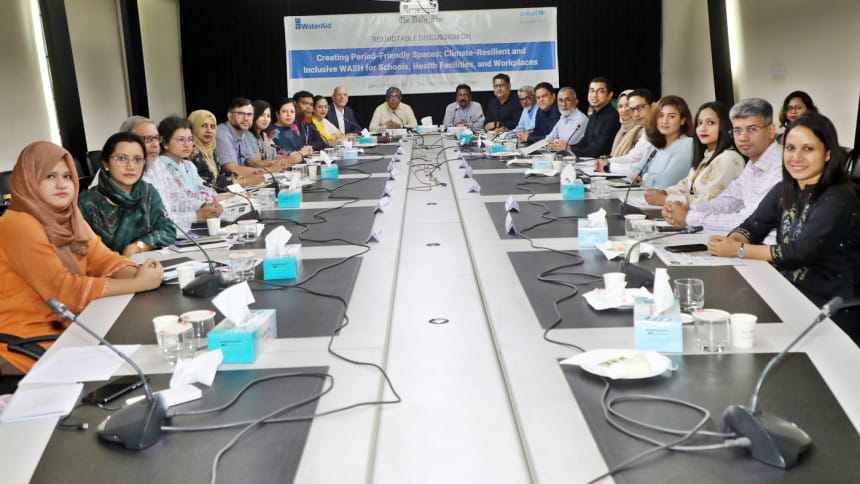
UNICEF and WaterAid, in collaboration with The Daily Star, organised a roundtable on 27 May 2025 titled 'Building Climate-Resilient and Inclusive WASH Infrastructure: Creating Period-Friendly Schools, Health Care Facilities and Workplaces.' The discussion brought together experts and stakeholders to assess the current state of Menstrual Hygiene Management (MHM) in Bangladesh, address existing challenges, and explore inclusive, sustainable solutions across education, healthcare, and workplace settings. Below is a summary of the discussion and the key outcomes.

Peter Maes, Chief, WASH Section, UNICEF
Menstruation is a natural part of life, yet millions globally including many in Bangladesh face stigma, misinformation, and limited access to safe menstrual products, sanitation facilities, and reliable information. According to UNICEF (2022), 500 million people worldwide lack adequate menstrual hygiene facilities. In Bangladesh, many adolescent girls miss school due to poor WASH infrastructure, unaffordable menstrual products, and persistent taboos.
This is not just a WASH issue it is about dignity, health, education, gender equality, and resilience. Inadequate menstrual health management affects school attendance, women's participation in the workforce, and the delivery of healthcare, especially during climate-induced disasters such as floods and cyclones.
The 2018 National Hygiene Survey found that 35.1% of schoolgirls were absent during menstruation. Only 24% of schools had clean, functional toilets, and 22% had sanitary pad disposal bins. Healthcare facilities also lacked adequate water and sanitation services.
Bangladesh's climate vulnerability exacerbates the crisis. During the 2022 Sylhet floods, women and girls faced severe shortages of sanitary products and lacked privacy in shelters.
We call on the government, NGOs, donors, and the private sector to invest in period-friendly, climate-resilient WASH infrastructure; implement the 2021 National MHM Strategy; support access to eco-friendly products; and prioritise the voices of girls and marginalised groups in all solutions.

Partha Hefaz Shaikh, Director – Programmes and Policy Advocacy, WaterAid Bangladesh
When WaterAid conducted surveys in 2011–12 and again in 2018, we observed some improvements in menstrual hygiene management. For instance, the average number of school days missed by girls due to menstruation decreased slightly, from 2.9 to 2.5 days. This progress reflects efforts to create more women-friendly environment in schools, but there is still a long way to go.
The key now lies in strategy. While we have the National Menstrual Hygiene Management Strategy 2021, the focus must shift to its effective implementation. WaterAid has long advocated for improvements to school toilet facilities, including the provision of sanitary pads and hygiene materials. These interventions are already beginning to make a positive impact.
However, broader challenges such as climate resilience and water availability must be addressed. For example, we have introduced rainwater harvesting systems to help ensure reliable access to water. It is vital to consider the environmental effects of climate change, particularly in school settings. Special attention should be paid to regions such as South Bengal and the coastal areas, where the water crisis is especially acute.
Ultimately, our goal is to create inclusive, safe, and supportive spaces for all, especially for girls.

Md Shofiqul Alam, WASH Specialist, UNICEF (Keynote Presentation)
Today's goal is to promote policy dialogue and foster collaboration across the WASH, education, health, gender, and climate sectors. Menstrual health is integral to achieving the Sustainable Development Goals, particularly those related to health, education, gender equality, and sanitation.
UNICEF's Menstrual Health and Hygiene (MHH) interventions focus on four core areas: social support, education, access to menstrual materials, and adequate facilities. Yet, significant challenges remain. Approximately, 54 million women and girls in Bangladesh menstruate, from which 14.4 million are adolescents. It is an alarming fact that, only 30 per cent knew about menstruation before their first period, and 68 per cent still rely on old clothes. While cloth is not inherently unsafe, it must be properly cleaned and dried. Many women prefer cloth for its availability and affordability. However, in slum areas, poor menstrual hygiene practices are leading to serious health issues, including infections and complications during pregnancy. In the ready-made garment (RMG) sector, women often wear the same pad throughout their shift, which poses serious risks to reproductive health.
The current status of Menstrual Hygiene Management (MHM) in institutions highlights multiple gaps, only 53 per cent of students receive adequate information before menarche, and 34 per cent of girls still depend on old clothes. The impact is stark where 30 per cent of schoolgirls miss two to three days of school each month due to menstruation, affecting their academic progress and increasing dropout rates.
This issue also affects workplaces. In the RMG sector, female workers reportedly miss an average of six workdays per month due to infections caused by poor menstrual hygiene. These are not merely hygiene concerns but are to critical public health risks with economic consequences.
Encouragingly, improvements are underway. Access to sanitary pads has been shown to significantly reduce infection rates. Bangladesh has taken meaningful steps: the National MHM Strategy (2021) is in place; gender-inclusive toilets are being introduced in schools; vending machines for sanitary pads have been piloted; and menstrual health education has been incorporated into school curricula.
Poor menstrual hygiene can lead to infections such as hepatitis B and thrush, and has lasting impacts on fertility and maternal health. Conversely, when girls have access to proper sanitary products, infection rates drop markedly.
As we mark Menstrual Hygiene Day 2025 under the theme "Together for a Period-Friendly World", it is time to commit to action.
Key Points from the Presentation:
- The National MHM Strategy was developed in 2021.
- A yearly roadmap should be drafted to ensure that every girl and woman across Bangladesh can menstruate safely and with dignity.
- MHM education has been incorporated into school curricula.
- Gender-inclusive, friendly toilet facilities are being scaled across the country, particularly in schools.
- Vending machines for sanitary pads have been introduced in selected public facilities and schools.
- The WASH in Healthcare Facilities (HCF) Strategy is being revised for 2025–2030.
- NGOs are actively promoting affordable and accessible sanitary products and menstrual cups.
- The National MHM Coordination Committee has been established by the 2021 strategy, which needs to be functional.
- The MHM platform plays the role in facilitating collaboration among organisations working on MHM, WASH, and SRHR.

Fayazuddin Ahmad, Policy and Advocacy Lead, WaterAid Bangladesh
Do we truly understand the specific needs of women and girls, particularly those with disabilities and those living in hard-to-reach areas? Do policymakers and implementers have a clear picture of how menstrual health and hygiene are managed across different regions of the country, and the barriers women must overcome to access menstrual products?
The 2021 National Menstrual Hygiene Management (MHM) Strategy must be implemented in a way that ensures inclusivity and leaves no one behind. Services must be accessible, affordable, and delivered with dignity, particularly for women and girls with disabilities. Adequate sanitation facilities must be made universally available. We must engage meaningfully and express, through action, that we care.
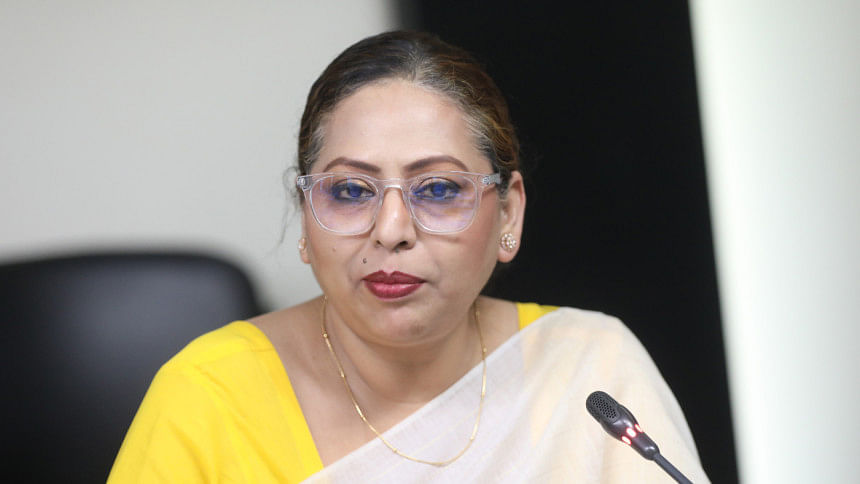
Mushfiqua Zaman Satiar, Senior Policy Advisor – Gender and Civil Society, Embassy of the Kingdom of the Netherlands in Bangladesh
For many women, a period-friendly world remains a distant reality. True inclusivity must embrace not only women but also men and diverse communities where genuine, sustainable development begins.
The National MHM Strategy must be implemented effectively. Access to menstrual products and sanitation facilities needs to be expanded and normalised. Menstruation has long been treated as a taboo subject, but it is the responsibility of the next generation to confront and dismantle these harmful stigmas.
Moreover, people with disabilities and those in remote regions continue to be excluded. These gaps must be acknowledged and urgently addressed to ensure menstrual equity for all.
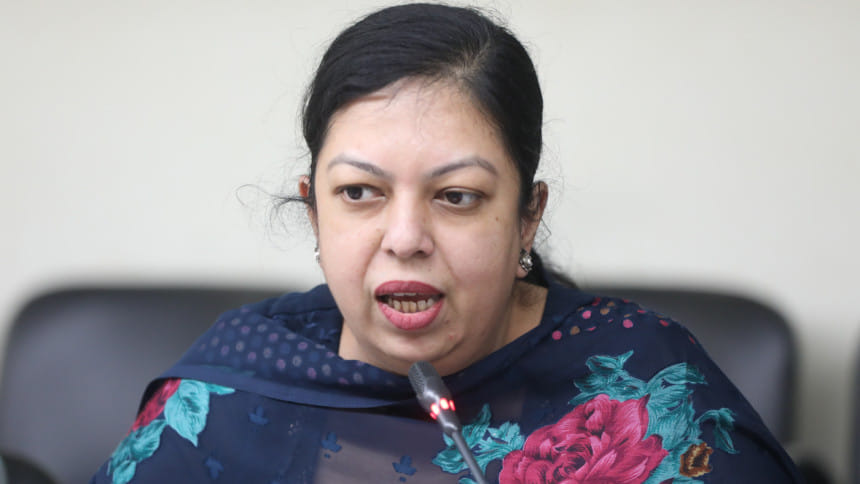
Dr Jesmin Zaman, Head of Marketing, Square Toiletries Limited
The private sector is often expected to balance profit with public good in menstrual health. While accessibility and affordability are widely discussed, their deeper implications are frequently overlooked. An average Bangladeshi girl requires around seven pads per cycle, costing as little as Tk 50. Yet usage remains low. Why? Because we are failing to deliver true accessibility, awareness, and inclusivity.
Even in 2025, schoolgirls still face inadequate access, although schools should be prioritised. In Satkhira, some girls with disabilities reportedly take birth control pills to stop menstruation, which highlights dangerous alternatives. Additionally, the chemical fragrances in napkins raise health concerns. We must question whether we are harming girls in the name of hygiene. Genuine inclusivity across all levels is essential to drive meaningful change by 2030.
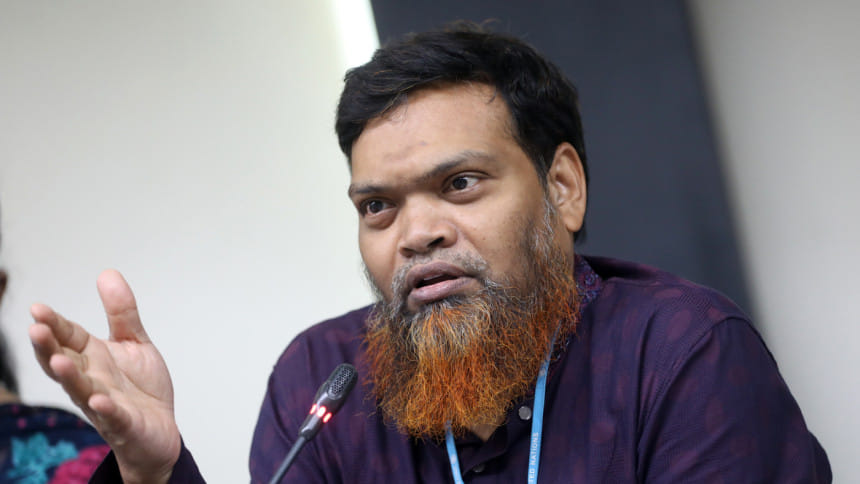
Dr Muhammad Munir Hussain, Programme Analyst, UNFPA
Between knowledge and skills lies a crucial missing link- attitude. Bangladesh does not lack knowledgeable people, but there is a clear gap in awareness and mindset. Without a positive attitude, skill development cannot take place.
Take child marriage as an example. Everyone knows it is harmful, yet it remains widespread. Similarly, we continue to provide information on menstrual hygiene, but knowledge alone is not enough. Programmes must go beyond education and actively challenge taboos.
These taboos are rooted in harmful social norms. Changing them requires inclusive, community-led dialogues. Only through this process can we break the silence, dismantle stigma, and encourage the use of sanitary pads.
We must invest in interventions that tackle root causes. Although development funding is declining, this gap can be addressed through strategic investments and well-designed corporate social responsibility initiatives focused on inclusive and climate-resilient infrastructure.
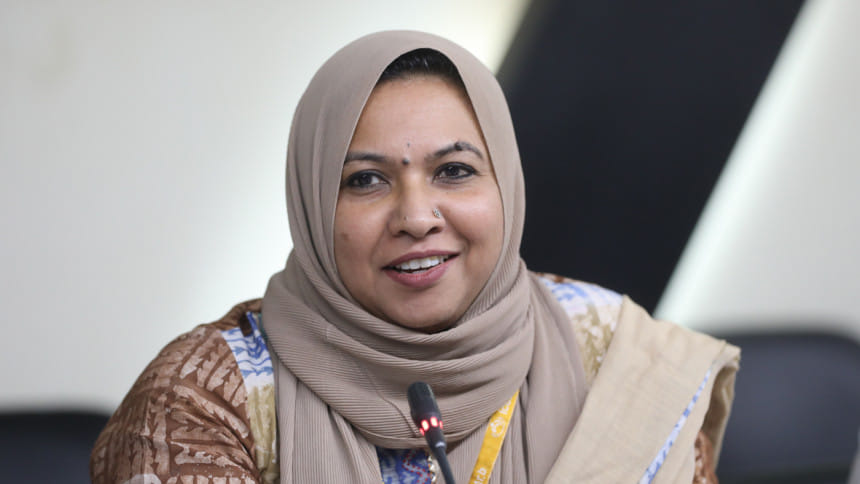
Shehrin Shaila Mahmood, Associate Scientist, Health Systems and Population Studies Division, icddr,b
As a contributor to the National Menstrual Hygiene Management Strategy 2021, I observed that although the strategy is comprehensive and includes a costed action plan, final endorsement remains pending. During field visits, I noticed that while objectives are outlined, specific activities often lack clarity.
For instance, the government prioritises WASH blocks, yet menstrual hygiene integration is uncertain. There is limited focus and investment, particularly in hard-to-reach areas. A major concern is the unsafe disposal of menstrual products, which contributes to environmental pollution and public health risks.
In the context of climate change, access to products must be safe to use and dispose. We must promote biodegradable and reusable options rooted in community ownership to ensure sustainability.
Addressing this issue across all sectors now will reduce future health risks and economic costs through improved MHM practices.
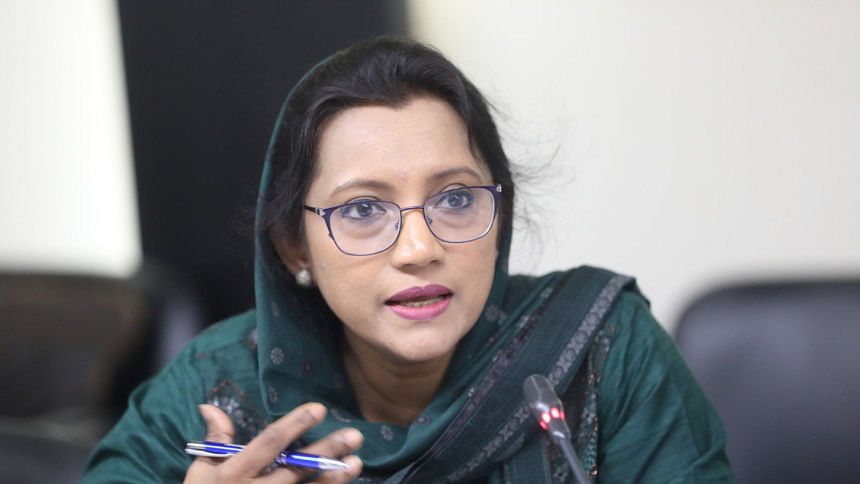
Nargis Akter, NPO, WASH and Environment, WHO Bangladesh
Menstrual hygiene must be recognised primarily as a health issue, not merely a hygiene concern. It encompasses physical, psychological, and social aspects. While there has been progress, many psychological barriers remain.
Women and girls must have access to accurate information, and menstrual products should be environmentally safe. Empathetic care and support from families are equally vital. Furthermore, school infrastructure , healthcare facilities, and workplaces should be gender-sensitive and regularly monitored to maintain safe and inclusive environments.
Ultimately, a comprehensive and multisectoral approach is essential to address all dimensions of menstrual health and ensure the dignity and well-being of all women and girls.
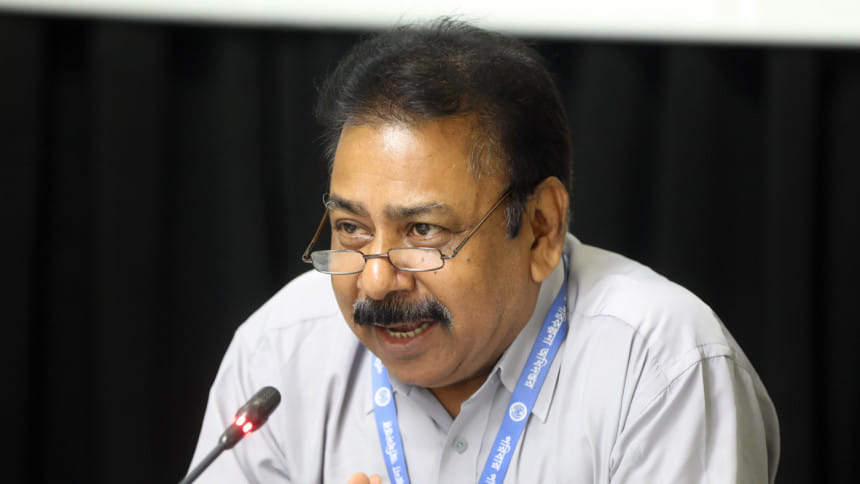
Dr Md Monjur Hossain, Programme Manager (Adolescent & Reproductive Health), MCH-Services Unit
Menstrual health, hygiene, and management are interconnected. We are no longer focusing solely on hygiene but also emphasising health. Without proper menstrual hygiene, individuals risk reproductive tract infections, sexually transmitted infections, and infertility. These are the critical messages we continue to share. Menstruation is fundamental to human life and must be treated with dignity.
As service providers, we communicate these messages within the broader framework of Universal Health Coverage in Bangladesh. However, menstrual health cannot be addressed in isolation. It requires collaboration, cooperation, and ongoing dialogue across sectors.
User needs must be central to infrastructure planning. Menstrual health services must be inclusive, accessible, and user-friendly. We have received directives to ensure that all new infrastructure includes features such as ramps and lifts to support persons with disabilities.
While period poverty remains a challenge, we remain hopeful. Menstrual health must prioritise equity and well-being over commercial interests.
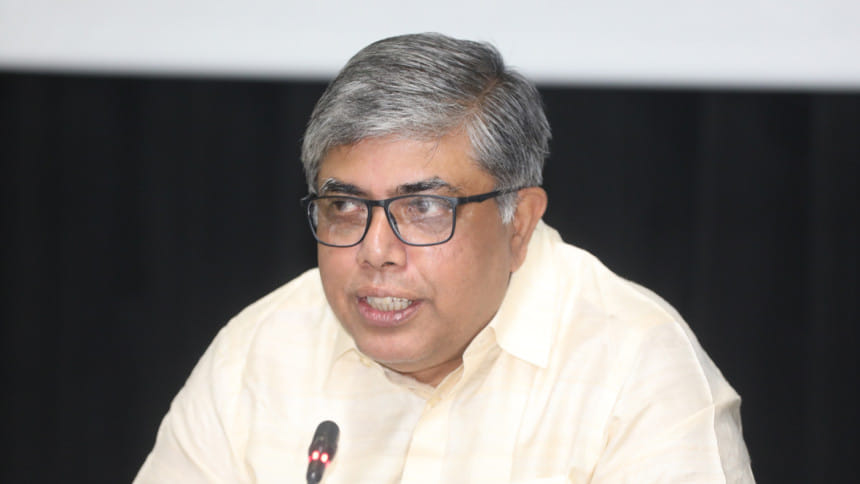
Professor Dr AQM Shafiul Azam, Director (Planning and Development), Directorate of Secondary and Higher Education (DSHE)
Menstrual Health Management (MHM) is both a cross-sectoral development and rights issue. While it is easy to talk sincerely about mindset change, the processis far more complex. We have initiated coordination meetings to ensure facilities and essential materials are available in every school. These steps may seem small, but they mark significant progress for the entire community.
The National MHM Strategy 2021 provides a clear blueprint, yet we must constantly ask who the beneficiary is and how inclusive our efforts truly are. Current initiatives are often fragmented. Stronger collaboration, especially within schools, is urgently needed. Among the six key pillars of the strategy, intersectoral collaboration and evidence-based planning are especially critical.
Change cannot come from short awareness training alone. We must challenge entrenched beliefs and psychological barriers. School programmes should involve students from the beginning to understand their actual needs.
With good government intent and strategy, it is now time for united, well-coordinated, and respectful action.
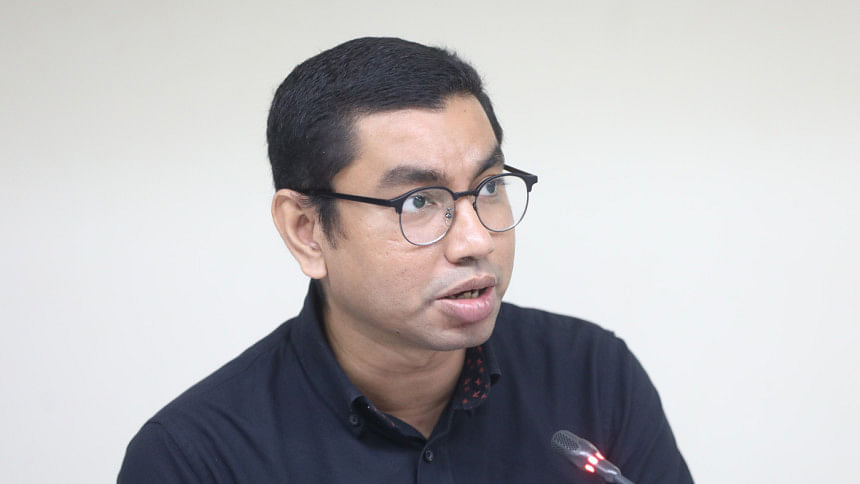
Tanjim Ferdous, In-Charge, NGO & Foreign Missions, The Daily Star (Moderator)
Although menstruation is a normal and natural process, it is still surrounded by various taboos and social stigmas in our country. Many schools, health centres, and workplaces have yet to develop a supportive and dignified environment where menstrual protection can be ensured, especially in areas vulnerable to climate change. We need to create climate-resilient, transitional, and period-friendly living facilities so that women and girls can live safely and with dignity.
S.M. Moniruzzaman, National Consultant, Policy Support Branch (PSB) at Local Government Division (LGD); Dina Afsana, Co-founder and COO of Vertical Innovations Ltd; Dr Sabrina Rafi, a Health Officer at UNICEF; Md. Shafiqul Islam, DGM of Development Programs at SAJIDA Foundation; Alauddin Ahmed, a Project Manager at ITN (International Training Network), BUET; and Mahnaz Worda Lithi, a Senior Officer of PIT at JAAGO Foundation, were attending speakers of this event.

 For all latest news, follow The Daily Star's Google News channel.
For all latest news, follow The Daily Star's Google News channel. 



Comments